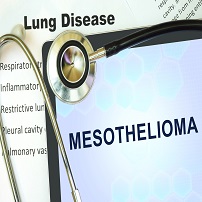
Researchers from Antwerp and Ghent University Hospitals are making strides toward finding better ways of diagnosing mesothelioma by employing breathomics to help detect early signs of the disease. Breathomics is the scientific name for breath analysis, and involves using an artificial nose or tests to detect mesothelioma biomarkers in the blood.
Mesothelioma is a very rare and aggressive form of cancer caused by asbestos exposure. It is usually very hard to detect and by the time doctors find it, the patient has often surpassed the early stages of treatment.
Scientists hope that breathomics can help them identify the cancer early, allowing them to treat and prevent further growth. They also believe that breathomics can help them monitor patients that are at risk for mesothelioma. Scientists are using this technology to target malignant pleural mesothelioma, a deadly type of lung cancer that attacks the lungs and chest wall by forming tumors along the pleura, a membrane along the long wall. Symptoms of pleural mesothelioma include chest pain, fluid buildup in the lungs, shortness of breath, fever, dry cough, and night sweats. Advanced symptoms can cause calcification of the lungs, gray tissue, and lung scarring.
Survival rate for pleural mesothelioma is low, with most patients having a life expectancy of one year after diagnosis. It is also the most commonly diagnosed form of mesothelioma. At least 2,000 people are diagnosed with pleural mesothelioma per year.
Pleural mesothelioma is one of many diseases linked to asbestos exposure. Residential and commercial properties built before the year 2000 often have asbestos in the walls, ceilings, panels, tiles, roofs, insulation, water tank, beams, and columns. Tradesmen (plumbers, electricians, construction workers, etc.) are most likely to be exposed to these materials.
Doctors typically perform x-rays, CT scans, and biopsies to find tumors. However, by the time they find tumors, it is often too late. There are not many treatments available for mesothelioma. Doctors often use a combination of chemotherapy, radiation, and surgery to care for patients. Scientists hope that breathomics can help them detect pleural mesothelioma early enough to curb its onset.
Breathomics is still in its early stages. Scientists are still working out cost efficiency, capabilities, and results. They are also working diligently to improve the electronic noses and breath tests currently on the market. Electronic noses, or e-noses, examine the compounds within a patient’s breath to determine if they contain mesothelioma cells. So far, e-noses have an 80 percent effectiveness rating. Doctors also use gas chromatography-mass spectrometry, which is a machine that separates and identifies chemicals. A combination of all these tools may help doctors to detect early signs of pleural mesothelioma. These instruments serve specific purposes and used together, they may help the early detection process.
If you or a loved one has been diagnosed with mesothelioma or are in danger of developing the cancer or other asbestos-related disease, you need the help of a Philadelphia asbestos lawyer. The law offices of Brookman, Rosenberg, Brown & Sandler serve Philadelphia County, Chester County, Montgomery County, Bucks County, Delaware County, New Jersey, and Philadelphia areas. Call us today to schedule a free consultation at 215-569-4000 or complete our online contact form.